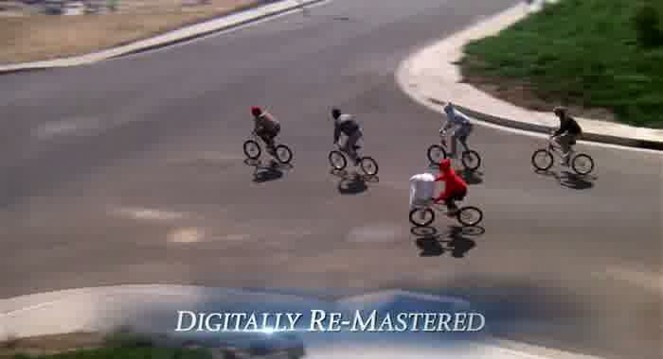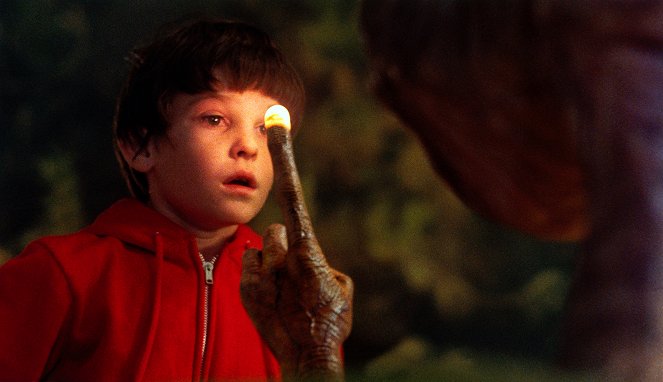Directed by:
Steven SpielbergScreenplay:
Melissa MathisonCinematography:
Allen DaviauComposer:
John WilliamsCast:
Henry Thomas, Dee Wallace, Peter Coyote, Robert MacNaughton, Drew Barrymore, C. Thomas Howell, Erika Eleniak, K.C. Martel, Sean Frye, David M. O'Dell (more)VOD (3)
Plots(1)
A little boy tries to help a stranded extraterrestrial return to its outer-space home. When 10-year-old Elliott discovers the creature hiding behind his house, it launches a heartfelt friendship--and a mission to return E.T. to his home before devious government workers place him in captivity. (Home Box Office)
Videos (6)
Reviews (10)
My natural emotional defenses against cutely ugly windbags with funny voiceovers were not overcome, so I kept seeing a legless youth dressed in a costume. And it doesn't help that Williams has basically made an opera out of it, and the soaring loops don't let up for a minute throughout. But at the points where the real and memorable boyhood adventure shines through, it still works well, and I still experience the adult institutions as depicted visually in the film in exactly the same way. It's just a shame that instead of letting that suburban environment of broken families, junk food, broken toys, and unsupervised children bubble more in the background, the film focuses all its attention on the innocence of the protagonists, mirrored in the giant, virginal eyes of a friendly and harmless alien.
()
Spielberg is a director who can work wonderfully with human emotions and has the gift of creating a perfectly tailored family spectacle. He has kept a sizable piece of the romantic boy inside him, who never stopped loving fairy tales and simply started fulfilling his childhood dreams and visions as an adult. His E.T.: The Extra-Terrestrial is a fairy tale with an idealized visitor from outer space, the kind that many children want to meet. A decent screenplay, a suitable budget, and careful direction make E.T.: The Extra-Terrestrial a timeless spectacle, where both children and adults are moved by the alien visitor. Additionally, at the time of its creation, it was a fascinating visual spectacle. Overall impression: 60%.
()
How else should I rate a film which showed me what a pizza looks like and that you can even eat it? But seriously, this film was the best of sci-fi for me until Terminator and The Thing landed on the video store counters. Watching it today convinced me that E.T. still has something to offer. I've already tasted pizza, so that’s one mystery less, but I had a great time just the same. The level of special effects thankfully doesn't reach today's "amazing" digital qualities, so I was able to enjoy a film that blew my mind in primary school, and I still like it very much.
()
The world of emotion that Steven Spielberg conjures up in E.T. could only have been created by a genius. How simply yet impressively he characterized the “bad guys” (ominous music + key ring), how he didn’t even need to look them in the eye and how he conceived everything from a child’s perspective...only a director who was born for this craft can do that. But...even though I have experienced E.T.’s story with all my heart and shed more than one tear while watching it, the film still lacks something more than just sincerely intended sentiment, something higher and something deeper.
()
The emotional core of E.T. can be summed up in two words: “Come” – “Stay”. Also, thanks to the fact that it doesn’t say (or explain) more than is necessary, E.T., together with some of Truffaut's films, remains one of the most reliable ways to briefly relive one’s childhood. Spielberg’s most personal film (suburbs, divorce, loneliness, escaping into a world that adults don’t understand) works both as an intimate family drama and as a breathtaking sci-fi movie (when one genre level supports the other), thus reversing the situation known from numerous Cold War movies in the same genre (to which ET visually refers). ___ A visitor from outer space does not pose a danger to the traditional American family, but rather – in the spirit of optimism that prevailed in Reagan’s America – helps to balance a single-parent family by taking the place vacated by the father. In the first half of the film, the absence of a father figure is cleverly emphasised by the fact that we never see the face of an adult male (a scene with Harrison Ford as the school principal, with his back turned to the camera the whole time, was edited out). Thanks, however, to a highly conspicuous bunch of keys, we remember one man, who in the end is distinguished by having greater understanding than the other adults in the film (and of course it shouldn’t come as a surprise to us when we later learn that his name is Keys). ___ In relation to Elliot, Keys undergoes the same transformation as E.T. does, changing from a threat into a relatively kind being. However, it suffices for the boy to get to know him better and overcome his fear of the unknown resulting from insufficient information. Due to the fact that Elliot’s perspective dominates from the beginning (and thus there is no elevation above the world seen through the eyes of a child), the viewer is led to the same perception of Keys's role in the narrative. This is not the only timeless (and clearly increasingly relevant) message of a film calling for tolerance and defending the right of every being to their own home. ___ Like a significant number of Spielberg’s movies, E.T. thus basically does not have a classic antagonist. It mainly tells a story about a clash of two worlds (childhood and adulthood, faith and rationality) that are mutually incomprehensible, but not entirely incompatible. The very suggestive “colonisation” of Elliot's home by scientists in white spacesuits is an inevitable developmental phase on the path from childhood to adulthood. The home, symbolising previously carefree childhood, must undergo a transformation, just as Elliot did. Together with the main protagonist and with considerable support from Williams’s uplifting musical motif, which for me will forever be the music of childhood, we can again experience a childlike fascination with the unknown, our own emotional maturation and a touching farewell to that which was beyond the comprehension of adults. ___ For me, E.T. is proof that you can fully appreciate the best children’s films only as an adult. Only then will you probably realise that the final emotional tears of childhood were not and still are not merely a manifestation of your suppression of mistrust and succumbing to intense playing on emotions, but also of the director’s honest understanding of childhood and his mastery of storytelling with precisely timed gags, twists, changes of pace and careful guiding of the viewer’s attention. I’ll be glad to be convinced of that again in a couple of years. 90%
()
(less)
(more)



Ads